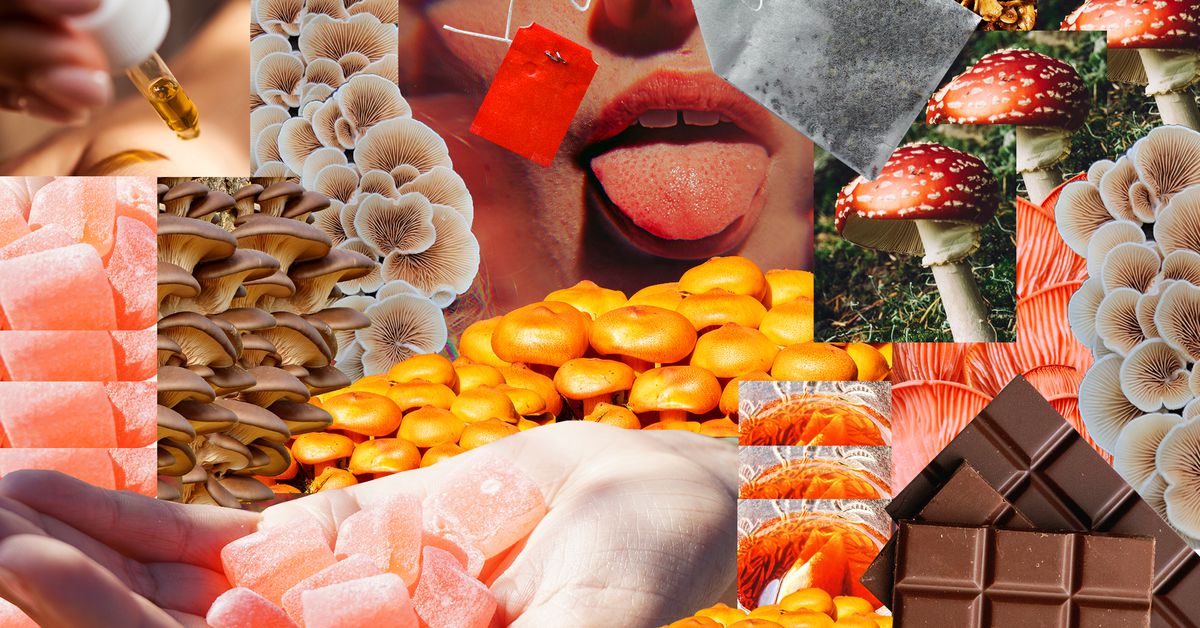
This year, one could hardly throw a canister of organic reishi capsules without hitting a bottle of vitamins or fizzy canned beverage touting the health benefits of mushrooms. To be clear, I’m mostly not talking about psilocybin, the “magic” mushroom known for sending people on trippy journeys into their psyche, though it was a big year for that too. I’m also not talking about the maitakes, chicken of the woods, and king oyster mushrooms that dominated restaurant menus as more people across the country considered going vegetarian. Nope, I’m talking about “functional” mushrooms, including reishi, lion’s mane, and cordyceps, all of which are legal for consumption in the United States.
There are now mushroom-infused sparkling teas, fancy chocolate bars, mocktails, coffee mixes, and granolas that claim to boost your brain, improve your mood, or help you live longer. Mud Wtr, a mushroom-based beverage that’s described as an adaptogenic coffee alternative, has dominated my Instagram and TikTok feeds for pretty much all of 2022, while shroom-focused supplements, like those made by vitamin brand Fungies, have exploded across store shelves and Instagram ads.
Mushrooms join an increasingly popular lineup of “functional foods” touting a wide range of health benefits, from improved cognition to less stress. In this category, brands advertise the alleged abilities of mushrooms like reishi and cordyceps alongside other vitamins, antioxidants, and other purportedly functional ingredients like shilajit resin and ashwagandha, a type of shrub that’s been used for thousands of years in Ayurvedic medicine. The scientific establishment hasn’t counted out the potential for the mushrooms in this new generation of supplements to have significant health benefits — some studies do indicate that consuming more mushrooms might reduce your risk of cancer, for example — though the research is nowhere near conclusive. Still, it’s not exactly surprising that, as we are all trying to figure out how to cope in a post-COVID world without losing our minds, we’re clamoring for foods and beverages that promise “healthy mood” and relaxation.
The progenitor of this particular mushroom moment is, arguably, Amanda Chantal Bacon’s notoriously woo-woo empire, Moon Juice. Founded in California in 2011 as a juice bar, Moon Juice was trafficking in the “bioactive super-shroom” cordyceps and the “protective” benefits of chaga, a type of tree fungus, long before most of us ever heard of functional mushrooms. Once lampooned as an out-of-touch and self-absorbed rich woman who spent something like $800 per day on various health foods, Bacon now heads a company in the “leading position in the ingestible wellness category.”
And in 2022, what was once the realm of fringe natural health enthusiasts has become a market on track to grow into a multibillion-dollar business. This is thanks to a couple of factors: Foraging for mushrooms, ramps, and other wild ingredients used to only be for chefs and serious botany nerds; now it’s an increasingly mainstream hobby. At the same time, psilocybin, the actual “magic mushroom,” is gaining popularity in the medical community as a prospective treatment for a wide range of psychiatric disorders. A few states, along with a smattering of individual cities, have legalized or decriminalized magic mushrooms, and therapists are using them to treat PTSD, depression, and anxiety. Even in places where psychedelic mushrooms haven’t been legalized, the popularity of microdosing — in which individuals ingest small, sub-perceptual doses of psilocybin to boost their mood with or without the direction of a therapist — is also on the rise. Microdosing isn’t just for hippies and alternative medicine types anymore; it’s something that soccer moms and tech execs alike are doing in an effort to treat depression, beat anxiety, and perhaps unlock some hidden brain potential.
As such, it’s not a surprise that some of the functional mushroom brands are attempting to capitalize on the trappings of magic mushrooms. Take, for example, Popadelics, a brand of dried shiitake mushroom “chips” in flavors like Thai chile and Parmesan truffle. The name aside, the Popadelics branding is the definition of trippy — all swoopy bright colors and fonts that look like they’re melting. “The first bite is almost a spiritual experience,” the brand’s website reads. “Send out good vibrations with each and every crunch.” The ’60s-esque branding is so intense, in fact, that the website even includes a disclaimer noting that Popadelics do not actually contain any psilocybin. They do, however, taste just fine.
What is happening with functional mushrooms is similar to the big CBD boom of the late 2010s. As more states legalized the cultivation of both hemp and marijuana, drinks and candies and baked goods of all kinds emerged to capitalize on the purported health benefits of cannabidiol, even though there are still many questions about its efficacy as a treatment for issues like pain and anxiety. Now it’s a multibillion-dollar industry.
In the coming years, it’s likely that your Nana might be picking up shroom gummies instead of CBD for her achy knees and aging brain. Whether or not anyone is actually getting any demonstrable health benefits from consuming mushrooms is still up for debate, but functional mushrooms aren’t going anywhere because mushrooms aren’t going anywhere. They’ve been sustaining life on this planet for literally one billion years, and there’s seemingly no end to the ways in which brands can package mushrooms as cures for what ails us.
Marylu Herrera is a Chicago-based artist with a focus on print media and collage.
